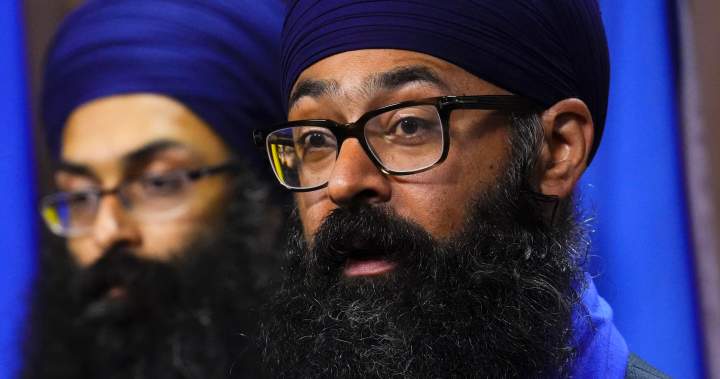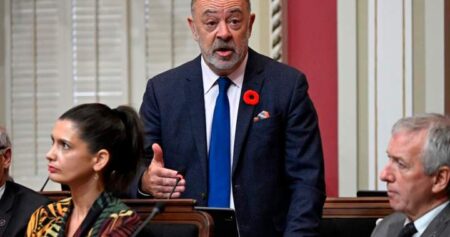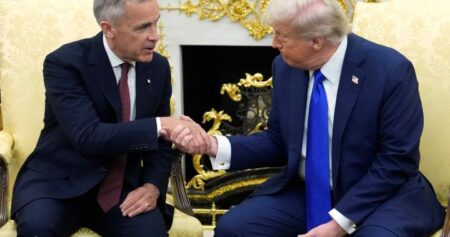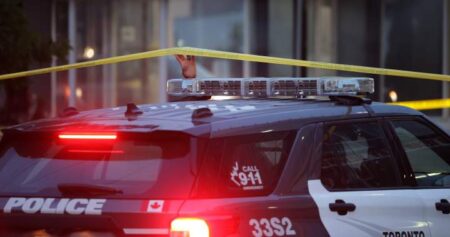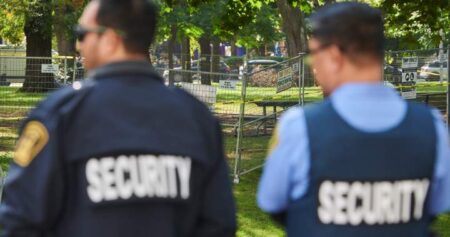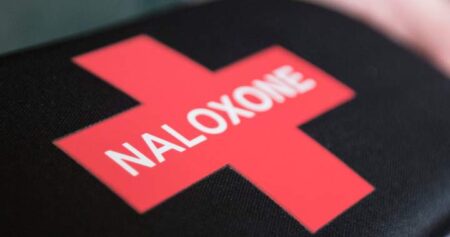For more than three years, Moninder Singh has been living each day knowing he could be assassinated. Police have advised the Canadian-born activist no less than three times they believed he was about to be killed.
As recently as March, police notified him of an imminent threat to his life and, in April, suggested he avoid public events. The warnings all came from the RCMP national security unit.
As a longtime B.C.-based campaigner for independence for India’s Sikh-majority Punjab state, Singh is confident he knows who wants him dead: the government of India.
The threats have forced him to vacate his home for months at a time, so his kids wouldn’t get caught in the crossfire, and move into hotels and Airbnbs, booking rooms under false names and using borrowed credit cards, trying to cover his tracks.
“Nobody should have to live like this,” he told Global News in an interview last week at his Surrey, B.C., residence.
Singh isn’t complaining, or hiding, and he has only ramped up the activism that upsets India. But with Prime Minister Mark Carney now mending ties with New Delhi in the name of trade, he feels let down.
Canadian Sikhs, particularly those like Singh who hold leadership positions, are the primary targets of Indian transnational repression and disinformation.
The RCMP has linked Indian agents to the 2023 murder of a B.C. Sikh temple leader, as well as shootings, extortions, arsons and assassination plots.
The foreign interference inquiry found that India’s meddling in Canadian elections, which allegedly included secretly financing candidates, was outpaced only by that of China.
India has still not publicly acknowledged its actions or promised to stop them, but the Carney government is nonetheless pushing to not only renew ties with New Delhi, but to deepen them.
“I think the entire Sikh community, including myself, feel a sense of betrayal in this,” Singh said. “But I also feel that it’s a betrayal of all Canadians and what Canada stands for.”
The prime minister’s office did not respond to a request for comment. Nor did India’s high commissioner in Ottawa, who recently denied any misdeeds by his government.
Foreign Affairs Minister Anita Anand said in a statement to Global News that it was “unequivocally false to claim that Canada’s foreign policy ignores these concerns.”
Canada continues to “raise these serious concerns with India. I raised security concerns directly in my meetings and there is also a regular law enforcement dialogue between senior officials in both countries,” she said.
She pointed to an ongoing RCMP investigation and the addition of the Lawrence Bishnoi gang, which India allegedly uses to commit violence in Canada, to the government’s list of terrorist organizations.
“We are thus taking numerous steps and we will continue to uphold the rule of law in order to ensure that all Canadians are protected,” Anand said.
That does not comfort Singh, who is still waiting for India to be held to account for what it has allegedly done in Canada.
Singh grew up in Clearwater, then a logging mill town in the B.C. Interior, hearing about the Punjab from his father, a forest industry worker originally from India.
When Singh was still a young boy, the Indian army stormed the Golden Temple, one of Sikhism’s holiest sites, where separatist militants were holed up.
The military operation was meant to crush the Khalistan movement that was seeking independence for the Punjab, but only inflamed it.
Prime Minister Indira Gandhi was assassinated by her Sikh bodyguards five months later, and in 1985, pro-Khalistan terrorists planted bombs on two Air India flights departing Canada, killing 331 people.
Singh said his father was “distraught” by the events in his homeland and began campaigning for Punjab’s separation.
“I was very young at the time, but I watched and I was involved and I was a part of protests,” Singh said.
“And as I got into my teenage years, I was already kind of well-versed in what our people were going through in the state of Punjab.”
As a Sikh youth leader in B.C.’s Lower Mainland, Singh became a leading voice for independence, which he sees as “reclaiming of the sovereignty we had before British colonization.”
He has never been involved in organizations promoting violence, nor has he advocated for it, he said, although he does believe in the right to “self-defence.”
He now heads the Sikh Federation, which formed last year to push back against “transnational repression and foreign interference targeting our community.”
Police first warned Singh his life was at risk in July 2022, the same day fellow activist Hardeep Singh Nijjar received a similar “duty to warn” notice.
RCMP Integrated National Security Enforcement Team officers arrived at Singh’s house accompanied by child and family services workers, who effectively told him he had to move out for the sake of his kids.
“It was very confusing as to what this duty to warn was, because we had never heard of them before,” he said.
Although he went along with it, he didn’t take the threat that seriously — until eleven months later, when Nijjar was gunned down in the parking lot of Surrey’s Guru Nanak Sikh Temple, where he was president.
“If we weren’t taking it seriously enough the year before that, we definitely were after the assassination,” Singh said.
Days later, the FBI announced it had disrupted a second plot, this one against Sikh activist Gurpatwant Singh Pannun, a New York-based associate of Nijjar’s who was also a pro-Khalistan campaigner.
The U.S. investigation traced the plot to the Research and Analysis Wing, or RAW, the intelligence arm that reports to Prime Minister Narendra Modi’s office in New Delhi.
A RAW officer named Vikash Yadav had allegedly contracted the killing to an Indian organized crime figure, inducing him with money and a promise to have outstanding charges against him dropped, but he had also mentioned three targets in Canada.
The plots were apparently driven by a decision to treat the Khalistan movement outside India as a major security problem, one that Ottawa was ignoring.
There was little evidence to justify those concerns. According to the Canadian Security Intelligence Service, pro-Khalistan extremists are only a “small group.”
India’s links to the Nijjar murder marked “a significant escalation in India’s repression efforts against the Khalistan movement and a clear intent to target individuals in North America,” CSIS wrote in its 2024 annual report.
Canada did the right things at first, according to Singh.
Then-prime minister Justin Trudeau went public with India’s suspected role in Nijjar’s murder in September 2023, calling the killing of a Canadian citizen on Canadian soil an “unacceptable violation of our sovereignty.”
Last October, citing a “significant threat to public safety in our country,” the RCMP announced a broader series of crimes had been “orchestrated by agents of the government of India.”
“Well over a dozen credible and imminent threats to life” had been uncovered, prompting police to warn members of the South Asian community, RCMP Commissioner Mike Duheme said.
He did not name those on the hit list but they included Jagmeet Singh, who had to lead the New Democratic Party while under police protection.
Ottawa responded by expelling India’s high commissioner and five other Indian officials who were deemed persons of interest in the RCMP investigations.
But¬Ýthen the federal election brought a new prime minister to power, and everything seemed to change, Singh said.
Elected to adapt Canada’s economy to the challenge of an erratic, pro-tariff White House, Carney came to office seeking out trade partners in Europe and Asia.
“Somewhere in all of that, India became viable again,” Singh said. “And we basically washed the slate clean and allowed them back.”
“That, to us as a Sikh community, creates just as big, if not a bigger risk now, because now Canada knows everything that India has done.”
Carney began by inviting Modi, whose right-hand man Amit Shah was allegedly behind Nijjar’s killing, to the G7 summit in Alberta in June.
His foreign minister followed up in August by announcing Canada and India were restoring ties and appointing new high commissioners.
National Security Advisor Nathalie Drouin visited New Delhi in September and said India and Canada had “committed to non-interference including refraining from transnational repression.”
“So I think that we have found a way, as I said, to address mutual concerns and for leaders to be able to talk about [a] trade relationship,” she told reporters.
Public Safety Minister Gary Anandasangaree put the Bishnoi gang on Canada’s list of terror groups, but without mentioning that the crime group works with the Indian state.
Anand met her Indian counterpart in New Delhi in October and said they had “reached consensus on a new road map for Canada-India relations.”
India has now invited Carney to India to forge a free trade pact that was shelved when the RCMP uncovered evidence Modi’s government was behind the Nijjar murder.
Ottawa and New Delhi are engaged in a “law-enforcement dialogue,” Global Affairs Canada said, adding Canada was “reassured by the level of engagement and cooperation by India in recent months.”
“At the same time, the global context is shifting and Canada is facing new, major challenges. India is the world’s fourth largest economy and a country of great global consequence,” the department said in a statement to Global News.
“It is in Canada’s interest to strengthen those ties as part of a broader effort to diversify trade and better manage the risks that Canada is facing today.”
NDP public safety critic Jenny Kwan, a target of China’s foreign interference, said it was “deeply troubling” that Carney was renewing ties with India.
“At a time when Canadians continue to receive duty to warn notices from the RCMP that their lives may be in jeopardy, it is unconscionable that the Carney government is re-engaging with India without demanding accountability,” the MP told Global News.
‚ÄúIt sends a dangerous message ‚Äî that the Liberals¬Ýare willing to look the other way when Canadians are targeted on our own soil,‚Äù she said, adding the government had still not launched a promised foreign agent registry.
The turn of events has left Singh feeling¬Ýas if¬Ýhe and Canada‚Äôs large Sikh community are sacrifices to economic strategy.
Indian High Commissioner Dinesh Patnaik’s recent denials and attempts to blame Canada for the rift in relations have added to the concerns.
“That, to me, shows India’s attitude,” Singh said.
Canada is restarting a relationship with “people that have no remorse. They have no recognition of what they’ve done, and based on the high commissioner’s comments this week, they have no intention of correcting anything.”
While police have been arresting street level Bishnoi gang members, Sikh organizations want the government to publicly disclose the details of India’s activities.
“Significant and substantive steps are required to regain the Sikh community’s trust,” Singh said.
Since Nijjar‚Äôs murder, Singh has again been forced to live apart from his family for long stretches.¬ÝFriends sometimes tail him with their cars, hoping they might be able to intervene if assassins make their move, he said.
He believes India’s objective is to silence its most outspoken critics, and he isn’t prepared to let them get away with it.
“We’re not gonna stop doing what we’re doing. That’s what India wants,” he said. “I’m not holed up in some bunker or anything like that. I’m very public.”
“I think I’m more public now than I have been ever. And I think there’s something drawing that out of me, and a lot of it has to do with my friend’s assassination.”
While he said he understands that not everyone agrees with what he has to say, as a Canadian he feels he has the right to express himself.
“But if India is going to come here and start shutting down one conversation with one group of people, it opens the door for many other countries to try and do the same.”
Stewart.Bell@globalnews.ca
Read the full article here





